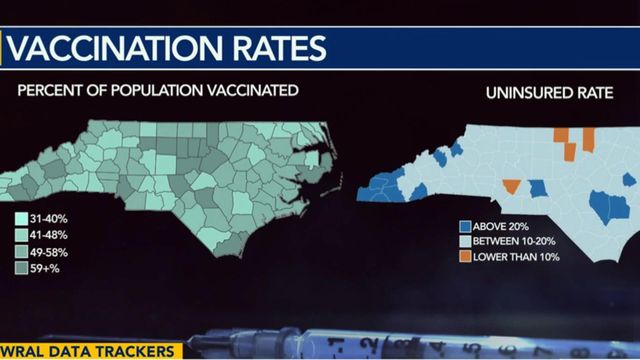NC's rural residents, uninsured younger people lead those hesitant to get vaccinated
In North Carolina, there's overlap in rural communities that are uninsured and that have low vaccination rates.
Posted — UpdatedThose under age 65 made up the bulk of that 21%. Data also shows that the state's rate of uninsured non-elderly residents, 13.8%, is higher than the national rate of 11%.
In North Carolina, there's overlap in rural communities that are uninsured and that have low vaccination rates.
That doesn't really surprise Mark Holmes, a rural health researcher with the Gillings School of Global Public Health at the University of North Carolina at Chapel Hill.
"It’s everything from how often you go to see a physician or how you view that recommendation," said Holmes. "Generally, quality of health care measures are somewhat lower in rural areas, and that’s due to access to health care services."
There is an outlier: Gates County, with the lowest rate of uninsured non-elderly people at 5.8%, has only 35% of residents who have received a first dose of vaccine.
Holmes says people who live in rural communities and who are uninsured don’t only lag behind on COVID-19 vaccines but all optional ones as well. He notes that the state is faring better than the nation when it comes to the rural-urban divide on vaccines. Still, the North Carolina Office of Rural Health is tailoring its response to break down hesitancy, especially when it comes to coronavirus.
"To make gains here, we have to recognize that each community has its own challenges and its own assets, and leveraging those could be really important," Holmes said.
Encouraging people, especially those without employer health insurance, to get vaccinated against COVID-19 now will likely save them hardships in the future and ultimately save North Carolinians from footing more bills.
"People don’t have $30,000 to pay for a bill coming out of the hospital, so where is that money coming from?" he said. "It’s all of us."
• Credits
Copyright 2024 by Capitol Broadcasting Company. All rights reserved. This material may not be published, broadcast, rewritten or redistributed.





